|
|
|
Sort Order |
|
|
|
Items / Page
|
|
|
|
|
|
|
| Srl | Item |
| 1 |
ID:
148916
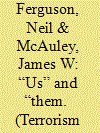

|
|
|
|
|
| Summary/Abstract |
This article draws on data from one-to-one interviews with members and former members of the Ulster Volunteer Force, Ulster Defence Association, Red Hand Commando, Ulster Political Research Group, and the Progressive Unionist Party to explore the dynamic and fluid perceptions of the Irish Republican Army (IRA) and Sinn Féin among Ulster loyalists. The article will explore how attitudes and perceptions are influenced by the shifting political landscape in Northern Ireland as Ulster loyalists come to terms with the new realities created by the peace process, security normalization, decommissioning, and the rise in the threat of dissident republican violence. The article will also demonstrate that these perceptions are not purely antagonistic and based on the creation of negative, stereotypical “enemy images” fuelled by decades of conflict, but pragmatic, bound to societal and local events, and influenced by intragroup attitudes and divisions, in addition to the expected conflictual ingroup vs. outgroup relationships. Finally, the article will explore how loyalists employ republicanism and the transformation of the Provisional IRA in particular, as a mirror or benchmark to reflect on their own progress since 1994.
|
|
|
|
|
|
|
|
|
|
|
|
|
|
|
|
| 2 |
ID:
171869
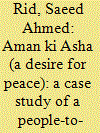

|
|
|
|
|
| Summary/Abstract |
Aman ki Asha is a joint initiative of the two leading media groups of India and Pakistan, The Times of India and the Jang Group of publications, which uses media cooperation for promoting people-to-people contacts and building peace. This is a unique initiative because in the history of peacebuilding, never before the mainstream media houses of conflicting communities are involved in such a peace initiative. Generally local media is seen inflaming the fires of conflict by following the nationalistic lines and portraying one sided picture of the conflict. After its launch in 2010, within few years Aman ki Asha emerged as one of the most successful peace initiatives between India and Pakistan but then suddenly in 2014 it became dormant when Jang group came under attack from the Pakistani military establishment and bilateral India-Pakistan relations worsened under Modi government in India. In this paper an attempt is made to provide a holistic story of Aman ki Asha covering its rise and decline. Moreover, the role played by Aman ki Asha in building peace between India and Pakistan at the top level, the middle range level and the grassroots levels is studied, and its current status is determined.
|
|
|
|
|
|
|
|
|
|
|
|
|
|
|
|
| 3 |
ID:
176501
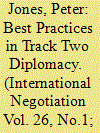

|
|
|
|
|
| Summary/Abstract |
While “Track Two Diplomacy” has been intensively researched since its founding some 60 years ago, much remains to be done to explore important gaps in our understanding of these dialogues. Track Two presents unusual research problems, given its operational and often confidential nature. The contributions to this special issue of International Negotiation tackle some of the key issues confronting the field in an effort to present where we stand in terms of best practices and where further thought and research is required.
|
|
|
|
|
|
|
|
|
|
|
|
|
|
|
|
| 4 |
ID:
158141
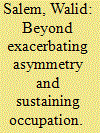

|
|
|
|
|
| Summary/Abstract |
Third party mediation is critical in pushing forward a new peace process that is based on Israeli and Palestinian compliance in fulfilling previous agreements, including an Israeli freeze on settlements. The freeze will be part of a transformative constructionist process that will allow both sides to negotiate from a more symmetrical position. It will also create more trust among the Palestinians by communicating that Israeli intentions are not about grabbing their land while discussing peace.
|
|
|
|
|
|
|
|
|
|
|
|
|
|
|
|
| 5 |
ID:
149494


|
|
|
|
|
| Summary/Abstract |
This article conceptualises the institutional narrative of the reconstruction of Stari Most (Old Bridge), regarded as an international symbol of reconciliation in Mostar, Bosnia–Herzegovina, as a staged reconciliation of the city. Constructed during Ottoman occupation Stari Most became a signifier of Mostar and was central to the growth of the city. Stari Most was destroyed in 1993 during the Bosnian war; restoration began five years following, and the bridge alongside Stari Grad (Old Town) was reopened as a United Nations Educational, Scientific and Cultural Organization (UNESCO) heritage site in 2004. UNESCO began operating in 1945 on the grounds that ‘peace must be established on the basis of humanity’s moral and intellectual solidarity’, based on a collaborative effort to celebrate diversity and innovation. In this article I conceptualise Stari Most as a stage of memory through identifying, firstly, the institutional staging of the reconstruction as a structure which ‘bridges’ divides, and secondly, the institutional narrative of the bridge as a symbolically reconciling structure, in a city which remains divided.
|
|
|
|
|
|
|
|
|
|
|
|
|
|
|
|
| 6 |
ID:
111139
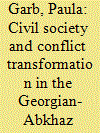

|
|
|
|
|
| Publication |
2012.
|
| Summary/Abstract |
Since the August 2008 war, citizens engaged in Georgian-Abkhaz conflict transformation projects have maintained their resolve to keep open channels of communication across the conflict and continue strengthening fire-proof defenses against violence. These defenses are still fragile, and face challenges from internal and external forces analyzed in this article. This article presents analysis of (1) civil society in Georgian and Abkhaz communities and its role in conflict transformation in the years leading up to the August war of 2008; (2) responses by Georgian and Abkhaz civil society leaders and outside facilitators to events in the months before and during the August war of 2008; and (3) civil society's role in conflict transformation since the August war of 2008 until 2011.
|
|
|
|
|
|
|
|
|
|
|
|
|
|
|
|
| 7 |
ID:
172181
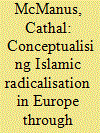

|
|
|
|
|
| Summary/Abstract |
Recent terror attacks across Europe have raised concerns about the issue of “radicalisation” amongst sections of the Islamic populations and how it might be successfully prevented. Drawing on the growing literature analysing “radicalisation” and applying the experiences of Northern Ireland over the past half-century, this paper argues that there is a need to move away from current discourses around radicalism and to explain the extremism that manifests itself in violent actions within the parameters of sectarianism. Arguing that this sectarianism is grounded in long-term processes of “Othering,” the paper will contend that there is a need for Western governments to recognise and address long-held grievances and fears within the Islamic community in order to reduce the threat of violence.
|
|
|
|
|
|
|
|
|
|
|
|
|
|
|
|
| 8 |
ID:
163059
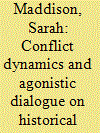

|
|
|
|
|
| Summary/Abstract |
This article contends that the type of high-level political consensus needed to reach a peace agreement is often insufficient for rebuilding and transforming wider social relations. Consensus-focused processes tend to suppress divergent views and experiences of conflict, particularly among grassroots conflict actors, and risk deepening social divides by homogenising diverse memories of past violence, with potentially dangerous consequences. In response to these concerns this article advances an understanding of agonistic dialogue and explores an example of such dialogue in communal conflict in Indonesia. Building on an understanding of effective dialogue as sustained, intensive and relational, this article also underscores the need for effective dialogue to have politico-institutional support and to be locally driven and owned by actors who are legitimate and trusted in the eyes of conflict protagonists.
|
|
|
|
|
|
|
|
|
|
|
|
|
|
|
|
| 9 |
ID:
093257


|
|
|
|
|
| Publication |
London, Routledge, 2010.
|
| Description |
xii, 243p.Pbk
|
| Standard Number |
9780415450416
|
|
|
|
|
|
|
|
|
|
|
|
Copies: C:2/I:0,R:0,Q:0
Circulation
| Accession# | Call# | Current Location | Status | Policy | Location |
| 054662 | 658.4053/JEO 054662 | Main | On Shelf | General | |
| 055121 | 658.4053/JEO 055121 | Main | On Shelf | General | |
|
|
|
|
| 10 |
ID:
088907
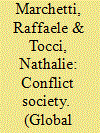

|
|
|
|
|
| Publication |
2009.
|
| Summary/Abstract |
This article analyses the relationship between civil society and conflict. It aims to provide an analytical framework to unpack this complex relationship and assess the impacts which civil society may have on conflict. In a first section, it analyses the implications of context on civil society, namely the implications that statehood, democracy, nationalism, development and international presence have on the nature of civil society. In the second section it examines more specifically the role of civil society in ethno-political conflicts, or as we rename it 'conflict society'. The final section turns to the identification of different factors determining the impact of civil society on conflicts, including political identities, frameworks of action and political opportunity structures in which civil society actors operate. Accordingly, the different combinations of these determinants lead to the formation of civil society actors and ensuing actions that can either fuel conflict, sustain the status quo, or build peace
|
|
|
|
|
|
|
|
|
|
|
|
|
|
|
|
| 11 |
ID:
103848
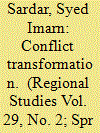

|
|
|
| 12 |
ID:
131261


|
|
|
|
|
| Publication |
2014.
|
| Summary/Abstract |
Developments in the East China Sea disputes in recent years appear to have set back Northeast Asian regional integration. Are there ways of turning these negative developments into more positive ones? Taking the Ecuador-Peru territorial dispute as a model, I consider the possibility of conflict transformation for the East China Sea dispute. The Ecuador-Peru border dispute was the most protracted in the Western Hemisphere, yet a peace agreement was finally reached in 1998, suggesting that even the most deeply ingrained differences and most persistent disputes can be transformed and ultimately overcome.
|
|
|
|
|
|
|
|
|
|
|
|
|
|
|
|
| 13 |
ID:
183034
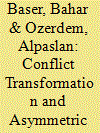

|
|
|
|
|
| Summary/Abstract |
In this article, we examine the dynamics of the Kurdish-Turkish peace process that collapsed in the summer of 2015. The negotiations began when the conflict reached a certain level of ripeness, one that made it possible for both sides to entertain the possibility of compromise on various taboo issues. However, in the face of both domestic and international developments, the process came to an abrupt halt. This article argues that the main reason the process stalled was because it was built from the start around the idea of “resolution” rather than “transformation,” a concept better suited to responding to highly fluid asymmetric conflicts.
|
|
|
|
|
|
|
|
|
|
|
|
|
|
|
|
| 14 |
ID:
145305


|
|
|
|
|
| Summary/Abstract |
If Armenian and Azerbaijani negotiators ever agree on the future status of Nagorno-Karabakh, it will not necessarily resolve the long-running conflict, because any peace treaty would require the consent of the Karabakh Armenians, whose political representatives are currently excluded from peace negotiations. It is difficult to imagine the Karabakh Armenians consenting to such a treaty without a change in their perception of the Azerbaijanis. According to the theory of conflict transformation/peacebuilding, Nagorno-Karabakh’s civil society should be able to make a contribution to this change. Using the example of four Nagorno-Karabakh civil society organisations, this study shows how they positively or negatively influence conflict transformation.
|
|
|
|
|
|
|
|
|
|
|
|
|
|
|
|
| 15 |
ID:
166807


|
|
|
|
|
| Summary/Abstract |
This article analyzes and compares four results of public opinion surveys conducted through the coordination of academic institutions in Thailand's Deep South. Based on the concepts of the conflict transformation, the study indicates, in the survey data conducted from 2015 to 2017, that people in the Deep South have had mixed feelings about the ongoing peace talks and the violent situation. The more open form of autonomous governance has been advocated by a sizable number of people, but the spiral of silence dominating the “no comment” groups still makes it problematic to predict the future. More studies need to be done and the article also shows that the survey research, if carried out properly, could reveal the unseen drivers of change in the conflict society.
|
|
|
|
|
|
|
|
|
|
|
|
|
|
|
|
| 16 |
ID:
140736
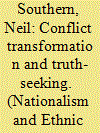

|
|
|
|
|
| Summary/Abstract |
The main work of South Africa's Truth and Reconciliation Commission (TRC) took place between 1996 and the publication of its final report in 1998. Its purpose was to assist citizens come to terms with the violence of the past. All participants in the conflict were subjected to the Commission's investigations including the National Party that had held power from 1948 to 1994. During these years, the party became well established as both an ethnic and racial party. However, support for it fell dramatically between 1994 and 1999 (the year after the TRC published its report). The party's fortunes worsened in the 2004 elections that resulted in its dissolution in 2005. This article explores the effects of the truth-seeking process on the electoral fortunes of the party. The analysis makes use of unique qualitative material gained from research conducted with former senior members of the National Party including two cabinet ministers.
|
|
|
|
|
|
|
|
|
|
|
|
|
|
|
|
| 17 |
ID:
087887


|
|
|
|
|
| Publication |
2008.
|
| Summary/Abstract |
This paper aims at exploring ways of resolving the India-Pakistan conflict the conflict transformation approach.
|
|
|
|
|
|
|
|
|
|
|
|
|
|
|
|
| 18 |
ID:
155950
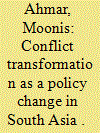

|
|
|
| 19 |
ID:
068115
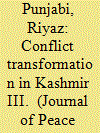

|
|
|
| 20 |
ID:
094863
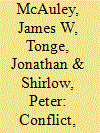

|
|
|
|
|
| Publication |
2010.
|
| Summary/Abstract |
Following the 1998 Belfast Agreement in Northern Ireland, levels of paramilitary violence have declined substantially. Among loyalists, the Ulster Volunteer Force (UVF) and associated Red Hand Commando (RHC) have formally renounced violence, and dissolved their 'military structures', and perhaps the most reticent of all of the major paramilitary groupings, the Ulster Defence Association (UDA), has taken on board the central tenets of conflict transformation, and 'stood down' all of its 'active service units' in the Ulster Freedom Fighters (UFF). Thus, paramilitary violence now is mainly confined to the activities of 'dissident' republican groups, notably the Real and Continuity IRAs, although low-level sectarian violence remains a problem.
Such dramatic societal and political change has resulted in a focus on the roles of formal party political leadership as agents of social change. This gaze, however, tends to obscure other important events such as the efforts, structures and approaches taken at the grassroots level to uphold and sustain conflict transformation and to maintain a reduction in violence. This article provides analysis of the role played by former loyalist paramilitary combatants in conflict transformation, and draws on material obtained through significant access to those former paramilitaries engaged in processes of societal shifts. In both personal and structural terms there is evidence of former combatants working to diminish the political tensions that remain as a result of the long-term inter-communal hostility developed across decades of violence and conflict.
|
|
|
|
|
|
|
|
|
|
|
|
|
|
|
|
|
|
|
|
|